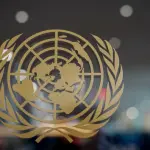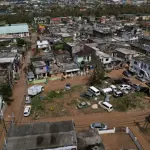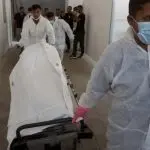(LONDON) — Russia and Ukraine exchanged large waves of attack drones overnight into Sunday as the two combatants maneuvered ahead of Friday’s planned summit in Alaska between U.S. President Donald Trump and Russian President Vladimir Putin.
Ukraine’s air force said Russia launched 100 drones into the country overnight, of which 70 were shot down or otherwise suppressed. Thirty drones impacted across 12 locations, it said in a statement posted to Telegram.
Russia’s Defense Ministry said its troops shot down at least 126 Ukrainian drones overnight.
Temporary restrictions on flights were introduced at airports in the southwest of the country in Vladikavkaz, Grozny, Saratov and Kaluga, Russia’s federal air agency Rosaviatsiya said, during the attacks.
In Saratov, regional Gov. Roman Busargin said one person was killed and several injured by a drone that fell near a residential building. An industrial facility was also damaged, Busargin said.
The Ukrainian General Staff later confirmed the attack on Saratov, saying in a statement that it targeted an oil refinery there. “Saratov oil refinery is one of the key facilities of the Russian Federation’s fuel infrastructure involved in providing oil products to the occupation troops,” the General Staff said. “Its annual processing capacity is up to 7 million tons of oil.”
“The Defense Forces of Ukraine continue to systematically take measures aimed at reducing the military and economic potential of the enemy in order to force it to stop the armed aggression against our state,” it added. “Every affected object on the territory of the Russian Federation involved in securing its criminal war against Ukraine brings us closer to just peace.”
Ukraine appears to have been ramping up its drone strikes in recent days. So far in August, Russia’s Defense Ministry has reported downing 1,117 Ukrainian drones — an average of around 117 per day, marking a notable increase on July’s daily average of 97 drones downed.
For Ukrainian defenders, August has thus far been quieter than July. Kyiv has reported facing 749 drones and 11 missiles so far this month, an average of approximately 75 drones and one missile each day.
July saw Russia set a new record number of aerial attacks, launching a total of 6,443 drones and missiles into Ukraine across the month, with a daily average of around 201 drones and six missiles per day.
While long-range strikes and grinding frontline combat continues, both Kyiv and Moscow are also maneuvering on the diplomatic front.
Since Trump announced that he would meet with Putin in Alaska on Friday, Ukrainian officials have gone on a diplomatic offensive to bolster the Western coalition in support of its peace demands.
President Volodymyr Zelenskyy and other Ukrainian officials have insisted that any negotiations must include Ukraine. Kyiv will also not officially cede any territory, accept limitations on its armed forces, or jettison its ambitions to join NATO and the European Union, Zelenskyy has said.
Putin, though, is demanding that Ukraine cede several regions — not all of which are controlled by Russian troops — in the south and east of the country, accept curbs on the size and sophistication of its military and be permanently excluded from NATO.
Russia’s demands, Zelenskyy has said, constitute an attempt to “partition Ukraine.”
Speaking from the White House on Friday, Trump suggested a settlement could include “some swapping of territories.” Zelenskyy swiftly rejected the proposal, saying Ukraine “will not give Russia any awards for what it has done” and that “Ukrainians will not give their land to the occupier.”
“Our positions were clear: a reliable, lasting peace is only possible with Ukraine at the negotiating table, with full respect for our sovereignty and without recognizing the occupation,” Andriy Yermak, Zelenskyy’s influential chief of staff, said in a Saturday statement after taking part in talks with Vice President JD Vance in the U.K.
French President Emmanuel Macron, German Chancellor Friedrich Merz, British Prime Minister Keir Starmer and Polish Prime Minister Donald Tusk were among the European leaders to sign a joint statement expressing their support for Kyiv in any peace negotiations.
“We welcome President Trump’s work to stop the killing in Ukraine, end the Russian Federation’s war of aggression and achieve just and lasting peace and security for Ukraine,” the statement read.
“We are convinced that only an approach that combines active diplomacy, support to Ukraine and pressure on the Russian Federation to end their illegal war can succeed,” it added.
“Meaningful negotiations can only take place in the context of a ceasefire or reduction of hostilities,” the joint statement said. “The path to peace in Ukraine cannot be decided without Ukraine. We remain committed to the principle that international borders must not be changed by force. The current line of contact should be the starting point of negotiations.”
Copyright © 2025, ABC Audio. All rights reserved.










